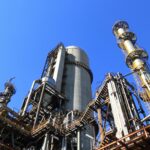Introduction: Industrial chemical processes are the driving force behind the production of a vast array of products we use in our daily lives. From pharmaceuticals and plastics to fertilizers and fuels, these processes shape our modern world. However, the challenges of resource scarcity, environmental impact, and economic efficiency have led to a growing emphasis on optimizing industrial chemical processes. In this article, we will delve into the world of industrial chemical processes, exploring the strategies, techniques, and innovations that aim to unlock efficiency and sustainability.
Process Optimization for Resource Efficiency: Resource efficiency lies at the heart of sustainable industrial chemical processes. By optimizing these processes, manufacturers can minimize raw material usage, energy consumption, and waste generation. Techniques such as process intensification, which involves combining multiple unit operations into a single step, and heat integration, where waste heat is utilized, play crucial roles in improving efficiency. Process simulation and modeling also enable engineers to identify optimization opportunities, allowing for the development of more efficient and cost-effective processes.
Green Chemistry: Safer and Environmentally Friendly Processes: The principles of green chemistry guide the development of sustainable industrial chemical processes. Green chemistry promotes the use of environmentally friendly solvents, catalysts, and reaction conditions to minimize the environmental impact of chemical processes. By replacing hazardous substances with safer alternatives and designing processes that generate less waste and pollution, green chemistry contributes to sustainable manufacturing practices. Industries are increasingly adopting these principles to reduce their ecological footprint and enhance the safety of their operations.
Process Safety and Risk Management: Ensuring the safety of industrial chemical processes is of utmost importance. Robust safety measures and risk management protocols are essential to prevent accidents, protect workers, and safeguard the surrounding environment. Process hazard analysis, safety audits, and the implementation of safety systems, such as emergency shutdown systems and relief devices, are critical aspects of process safety. By effectively managing risks and continually improving safety practices, industrial chemical processes can operate in a secure and sustainable manner.
Continuous Manufacturing: Enhancing Efficiency and Flexibility: Traditionally, batch processes have been common in the chemical industry. However, continuous manufacturing is gaining momentum due to its potential to enhance efficiency and flexibility. Continuous processes allow for continuous production, real-time monitoring, and better control of reaction conditions. They also enable the integration of multiple steps, reducing the footprint and improving overall process efficiency. Continuous manufacturing offers benefits such as reduced energy consumption, improved product quality, and faster time-to-market, making it an attractive option for sustainable industrial chemical processes.
Process Analytical Technology (PAT): Process Analytical Technology involves the real-time monitoring and control of chemical processes to ensure optimal performance and quality. PAT utilizes various analytical techniques, such as spectroscopy, chromatography, and mass spectrometry, to measure critical process parameters and provide immediate feedback. This information allows for proactive adjustments and decision-making, leading to improved process efficiency, reduced variability, and enhanced product quality. PAT enables the implementation of quality by design (QbD) principles, resulting in more robust and sustainable industrial chemical processes.
Circular Economy and Waste Valorization: Transitioning towards a circular economy is a key objective for sustainable industrial chemical processes. Waste valorization and recycling are critical components of this approach. By implementing innovative technologies such as chemical recycling, bioconversion, and waste-to-energy processes, industries can recover valuable materials from waste streams, reducing the reliance on virgin resources and minimizing environmental impact. The integration of circular economy principles allows for the creation of closed-loop systems, where waste becomes a valuable resource, contributing to sustainable and resource-efficient manufacturing practices.
Digitization and Industry 4.0: The digital transformation and the concept of Industry 4.0 are reshaping the landscape of industrial chemical processes. Automation, data analytics, machine learning, and artificial intelligence are revolutionizing process monitoring, optimization, and decision-making. Real-time data collection and analysis enable predictive maintenance, energy optimization, and process control, leading to improved efficiency and reduced environmental impact. Digitization also facilitates remote monitoring and collaboration, enhancing operational flexibility and resilience.
Conclusion: Industrial chemical processes are undergoing a paradigm shift, driven by the urgent need for efficiency and sustainability. Through process optimization, the adoption of green chemistry principles, continuous manufacturing, process safety, and risk management, as well as the integration of circular economy practices, industries are working towards a more sustainable future. The combination of process analytical technology and digitization empowers manufacturers to make data-driven decisions, optimize operations, and reduce their environmental footprint. By unlocking efficiency and embracing sustainability in industrial chemical processes, we can create a more resource-efficient, environmentally friendly, and economically viable chemical industry that supports a sustainable future for generations to come.













